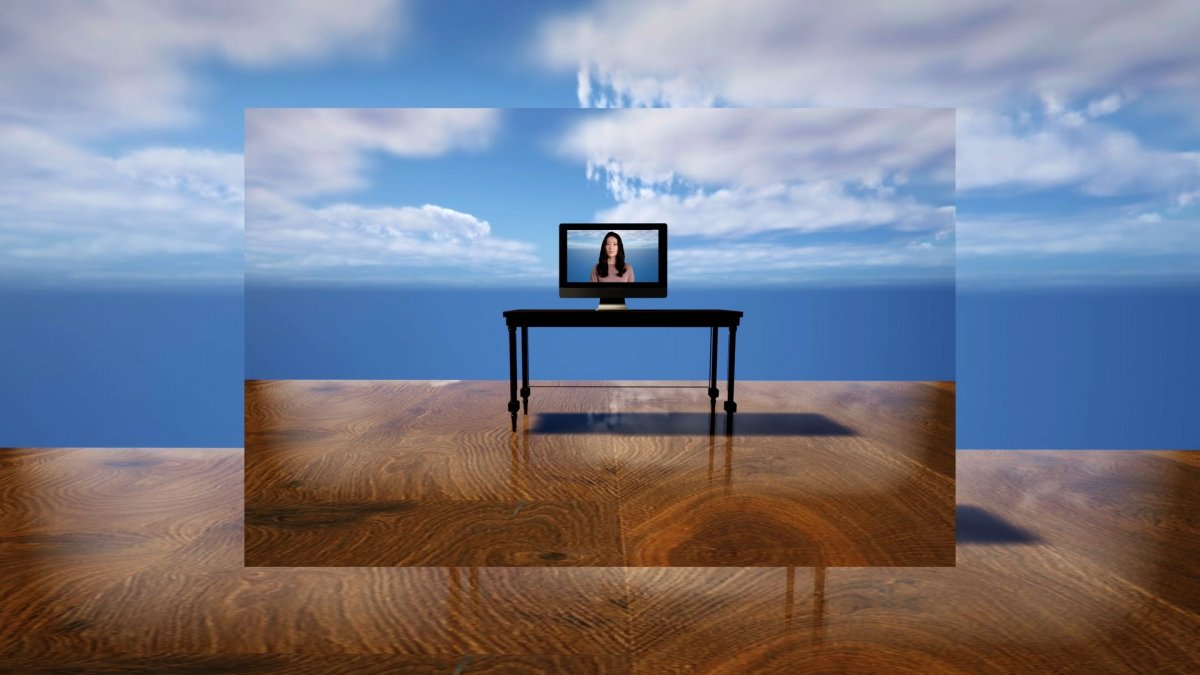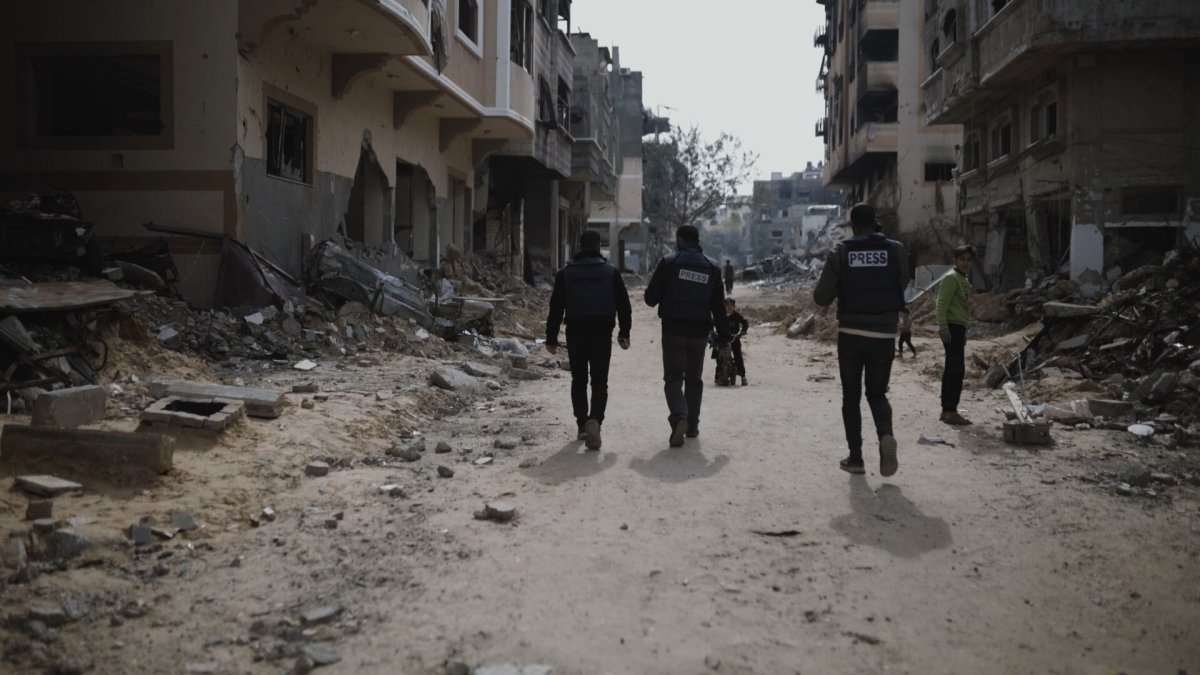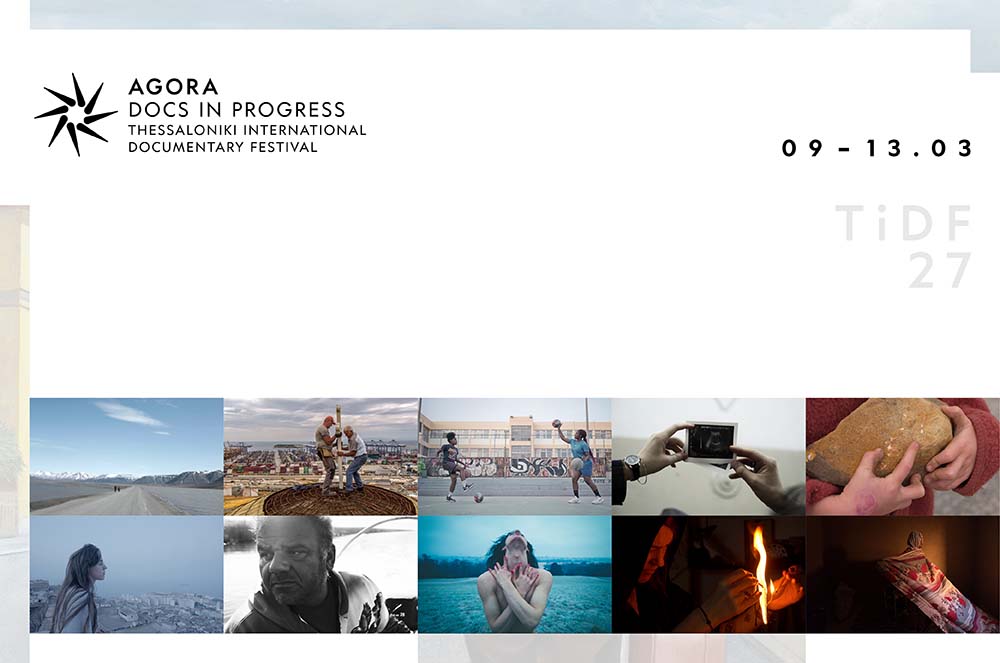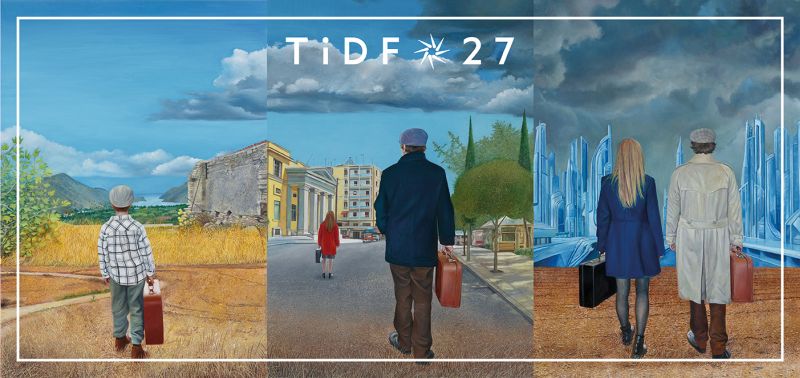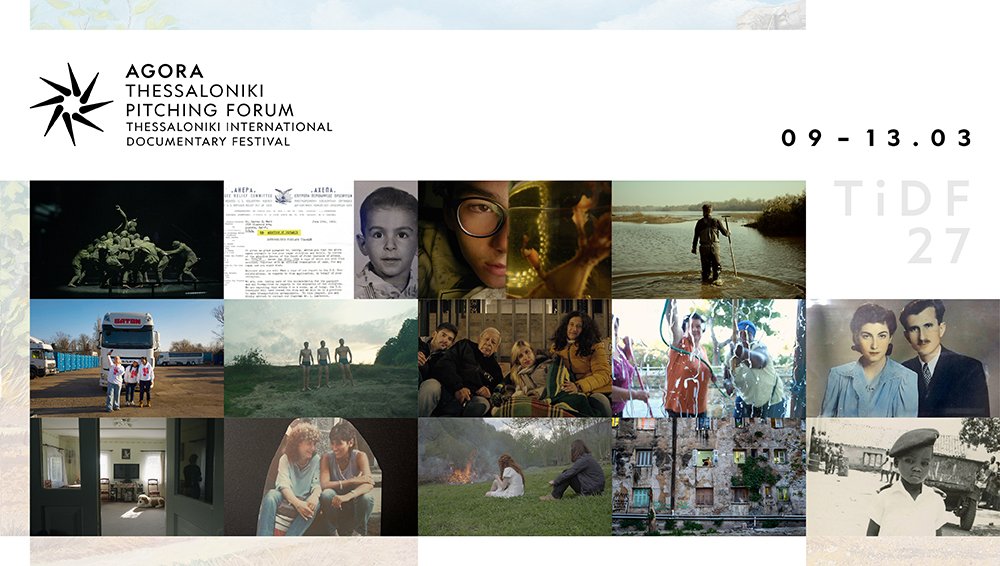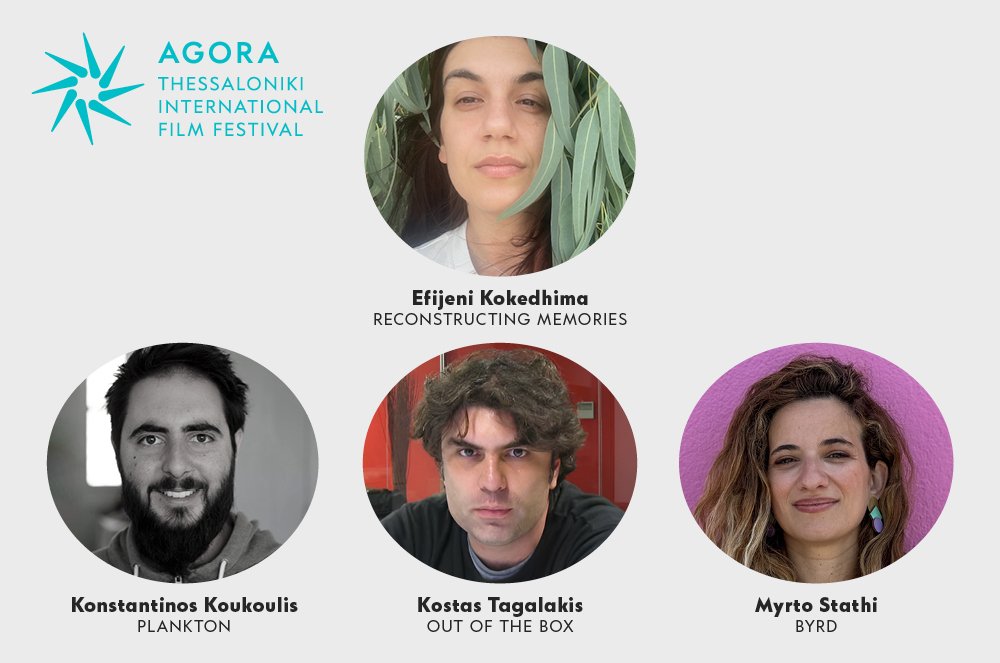26th THESSALONIKI DOCUMENTARY FESTIVAL // 7-17/3/2024
Greek Documentary Association’s Workshop - Documentary and Artificial Intelligence: A Connection Under Question
Prompted by the rapid developments related to A.I. applications in audiovisual productions, Hellas Doc (Greek Documentary Association) organized a discussion, titled “Documentary and Artificial Intelligence: A Connection Under Question,” on Thursday, March 14th, at the John Cassavetes theater, in collaboration with the 26th Thessaloniki International Documentary Festival.
The speakers participating in the discussion were: Manolis Andriotakis, Journalist and Author, Georgia Koutrika, Research Director, Athena Research Center, Nicole Alexandropoulou, Film Director, and Victoria Vellopoulou, Film Director. The discussion was supplemented with interventions from: Apostolos Karakasis, Filmmaker and President of the School of Film Studies, Aristotle University of Thessaloniki, and Argyris Theos, Director of Photography, and representative of the Royalties Collective Management Organization, Isocratis. The moderator was Angelos Kovotsos, on behalf of the Greek Documentary Association.
The discussion was kicked off with the presentation of an excerpt from Stanley Cubrick’s film, 2001: A Space Odyssey, and initially Angelos Kovotsos took the floor. “Firstly, we would like to express our gratitude to the Festival for granting us the means to carry out this event, as it has done every year. We, also, wish to thank our speakers, as well as our two distinguished guests, who will each share with us their experience and their perspective, but primarily will put forth the dilemmas concerning the issue of A.I.”
Initially, the floor was taken by Victoria Vellopoulou: “When we talk about documentaries, and we are just starting out experimenting -as it is too soon to describe it with any other word- with A.I., we develop a personal contact with the viewer, an oral agreement expressing that ‘what I am about to show you is real, it has truly happened, or it is currently happening.’ We have to be extremely careful, because if for any reason we break, breach, or violate it, we lose the viewer. Our work loses its credibility, it’s no longer a documentary film. We can utilize A.I., however it must be used carefully.”
As the filmmaker explained, “This last year I have engaged with A.I. extensively, I have collaborated with theater directors, directing the videos featured in their performances. A.I. provides the possibility of boundless imagination, so it renders the transportation of the audience to these worlds faster and more affordable.”
Ms. Vellopoulou then showcased images and videos from her work, explaining how it is integrated in theater productions, as part of the set. She also referred to how A.I. becomes a part of the documentary, Syrrako 1821, that she crafted this year, which focuses on the village called Syrrako at North Tzoumerka, and its involvement in the Greek Revolution of 1821. “I used images created by A.I. instead of reenacting the scenes. The outcome is much more impressive than whatever a film’s budget could manage to recreate. It started out as an experiment so that I could see if it can be integrated in documentary filmmaking. I encountered numerous challenges, but A.I. is rapidly evolving, with terrifying rhythms, while every couple of months new applications emerge to provide a solution for some of your issues.”
In response to a question regarding what A.I. is, Georgia Koutrika answered: “If I had to describe the relationship between man and machine, I’d say it’s a relationship still under investigation. The machine stares at man, saying ‘What is a human being, I’d like to emulate you,’ while man stares at the machine, saying ‘What are you up to, now?” At Athena Research Center, we are conducting research on Artificial Intelligence. A.I. is attempting to develop intelligent computing systems. Namely, programs and machines that imitate a human being’s intelligence. That is to say our ability to learn, resolve challenges, walk. For example, Robotics is also Artificial Intelligence. When we refer to machine learning, we talk about the program’s ability to learn by examining data, discovering patterns, and correlations, which they later utilize in order to make predictions, and decisions for us.”
Ms. Koutrika drew upon Netflix’s example. “For each of us, the screen we look upon when opening Netflix is completely different. That’s because behind the scenes of a system, a lot of algorithms are employed, for each part of the screen, attempting to observe what people consume, or the sequence they watch films in, etc. That is how the content they present to us is determined. However, today the apps have flooded our lives, they are everywhere. For example, such systems are used in the education system in the USA, in entrance exams, in order to decide which students to admit. They are also used in the health care system and in the military, which funds such research. In 2016, we had google translate. Achievements have been made in image recognition. Its most important applications, however, are in the fields of medicine, aiding in manufacturing drugs more quickly. In the manufacturing industry, in autonomous cars. We also have Gen(erative) A.I.; the sphere of A.I. that you feed it with something, and it provides you with content. It may be a text such as google translate, or ChatGPT, which can be seen in great amounts today. It may be image, such as Dall-E, but also a combination of video, and music.”
Next, Georgia Koutrika mentioned the other side, how someone addresses Artificial Intelligence, wondering how it operates. “Artificial Intelligence essentially steals the idea from how we, humans, function. Our mind is a set of neurons; each neuron is a small unit that receives a signal at the input and, if activated, gives a signal at the output, activating in turn other neurons. This idea emerged in 1945. The neuron, for us scientists, is a function. One level of neuron learns and feeds the next. For example, GPT-4, which preceded ChatGPT, has 100 billion million neurons. That's about the number of neurons that we have”.
Furthermore, Artificial Intelligence can learn to identify faces. As for where a system learns from, google translate learns from all the pages that exist, related to translations. When we want to recognize numbers, we give corrupted images to a model and prompt it by saying ‘learn to recognize them.’ These are the so-called Diffusion Models. A lot of us have seen Karate Kid. Mr. Miyagi never taught karate to LaRusso. The idea for Self Supervised is exactly this. If we teach a system to do simple things, it will learn to do more complex things. Then we're led to the technology called Transformers. The last one is Reinforcement Learning, which learns from everything we do, including the simple example of how we train our dog."
The discussion continued with Nicole Alexandropoulou. According to her: "I'm here with my film In the Image of Human. It's a film I was commissioned to do by the National Research Foundation and the context was the relationship between religion and science. Of Christianity, more specifically, and the issues that arise about the use of artificial intelligence. The primary question of the film is one, whether human consciousness can be created through A.I. I had difficulty in finding a narrator who would gather the various clues to move the story forward. I thought of well-known actors such as Tom Cruise or well-known voices of scientists. That's where I decided to create an avatar, starting initially with ChatGPT, without having decided whether it would be a man or a woman or what age it would be. It was not easy at all. At some point, I finally made a choice. Then, I had to merge a voice that matched the person. In essence, I was casting using avatars. Then, we also came up with a background with graphics. What annoyed me is that while I was working on the story, I couldn't move forward. I could use all this technology in order to write a script, as there are huge databases. Also, with all these virtual environments you can see your set. These can actually become an ally in how our creativity works. An important element both for post production and for the promotion of our film," she pointed out.
Manolis Andriotakis spoke about the dilemmas and ethics of A.I. "I didn't invent the concept of synthetic reality obviously, it's a term that basically describes a technical mediation. Robots have not conquered the world. So, imagine a machine that connects everyone and somehow arranges numerous relationships of humanity. Or rather, imagine a machine without which it would be very difficult to live. That machine is the internet and we are part of it. Part of this giant robot. The A.I. works with the data it gets from the internet, which is us. We are integral parts of this machine. We see a representation of reality that is not reality. The key difference between the technologies of the past that we all use as documentarians is that A.I. has no limitation. It is a general-purpose technology that can do whatever it wants. But it raises many issues such as philosophical and environmental issues. I am also concerned about the political issue. It is a super-machine to which we will delegate more and more of our life decisions. It will decide who gets hired and who doesn't, who gets an allowance, which director gets the biggest grant, etc. The issue of moral intelligence concerns us all, even the programmers themselves may not know where the deep neural networks we have seen end up. Privacy is also a big issue. There will never be an A.I. that is fully impartial, just as there can never be a fully impartial human being. At some point, machines will be forced to choose between two evils. Are we as a society ready for that? Recently, a very good law was passed in the European Union, the A.I. Act, which prioritizes certain risks. For example, if you are on the street and a camera identifies you, it is forbidden to identify you except through prosecutorial intervention. There should also be some ethical rules. In order to make these means credible, we must all have knowledge of them. This knowledge must be accessible to children from primary school onwards. We must learn that what we have in our pockets is a super weapon that takes away our autonomy. We have an illusion of free will. Even the documentary could serve as a fire escape. We have no safety net. As Isaac Asimov said: ‘Better to make a good future than predict a bad one’."
The intervention of Apostolos Karakasis followed: "In principle I shouldn't talk because I have no idea about the subject. A.I. has been a hot topic at every professional and scientific meeting lately. In film education, what we're concerned about is if everything we teach today will be useful in the next five or twenty years. Because in every artistic discipline in film, the facts are changing. A new student needs to understand the possibilities that are opening up. To acquire technical skills in an environment that changes from day to day, and then apply them to the research work he or she produces. And to develop critical thinking about the implications of this technology. This is a future that we cannot deny. I believe that A.I. in the audiovisual sector is a revolution that will be comparable to the digital revolution of thirty years ago. First of all, the trainers themselves will have to be trained. There should be funds in every discipline for this purpose. In studies we should emphasize this uniqueness that man can bring to his creation. The mission of art is to surprise. A world that produces these spectacles through algorithms is a world that is a bit boring. The history of art is a history of successive revolutions, of overturning the rules of the day. In the field of documentary filmmaking, I agree on the issue of transparency, that we need to go back to the principles of ethics and make manifestos again, like the one Trier made with the Dogma, where the director clearly states his intentions. In a way, ChatGPT can give you tips, for example with a workshop on how to make a good pitch. The professional implications will be huge."
The floor was then taken by Argyris Theos: “Douglas Adams is a British author, who has written a series of books called A Hitchhiker's Guide to the Galaxy. This is a funny adventure that belongs to the realm of fantasy, the pretext for which is the demolition of the planet Earth to allow a hyperspace bypass to be made. In the course of the book, we learn that some advanced race, somewhere out there in the universe, had once built a powerful computer whose purpose was to answer the ultimate question about life, the universe and everything. Then this super-advanced race created a new computer that was the planet Earth, and its purpose was to formulate the question, the answer to which is 42. The important fact is that while humans were part of this computer, the race that built it was the mice. The ethical dilemma that arises is ultimately where intelligence begins and ends, when the robot begins to have self-awareness, when it stops following rules and when it begins to create its own rules. The Berne Convention, the charter of intellectual property, says that if something is original, it is art. At the rate technology is galloping, we don't know when the time will come when we will stop using A.I. as a tool because it will be imposed on us. Many practical issues of essence enter the fore, such as union and trade union issues which are huge, as many people will lose their jobs. There is also the issue of intellectual property of already existing works. The robot draws its information from somewhere. Who supplies the information? What right do they have? When Getty Images filed a complaint about Stability A.I. -because its robots produced images with Getty’s logo-, Getty turned against Stability, but not against the company that managed the database that Stability was learning from. The distorted notion that since I'm giving it to you for free, I don't have to pay royalties, must be addressed and dealt with right away. Because A.I. will take a film to feed to the robot, which will in turn be taught how to make films. And this is already occurring, featuring Netflix. All this cannot be compensated.”
“The community of documentary filmmaking must initiate the dialogue, itself, in regards to intellectual property. We, the scientists, are struggling to render the algorithms less random, to imbue them with a fair sense of justice. And to ensure that machines and algorithms will always function under human guidance. Yet, there are companies guided by profit. A year ago, the industry’s key players, Elon Musk included, signed a letter asking every single A.I. Research Center to stop all activity for a six-month period, as a way of providing time for humanity to lay the foundations for Artificial Intelligence’s correct use. Of course, nobody stopped researching, which says a lot,” Georgia Koutrika said when asked by the audience if a dialogue has started regarding Artificial Intelligence.








